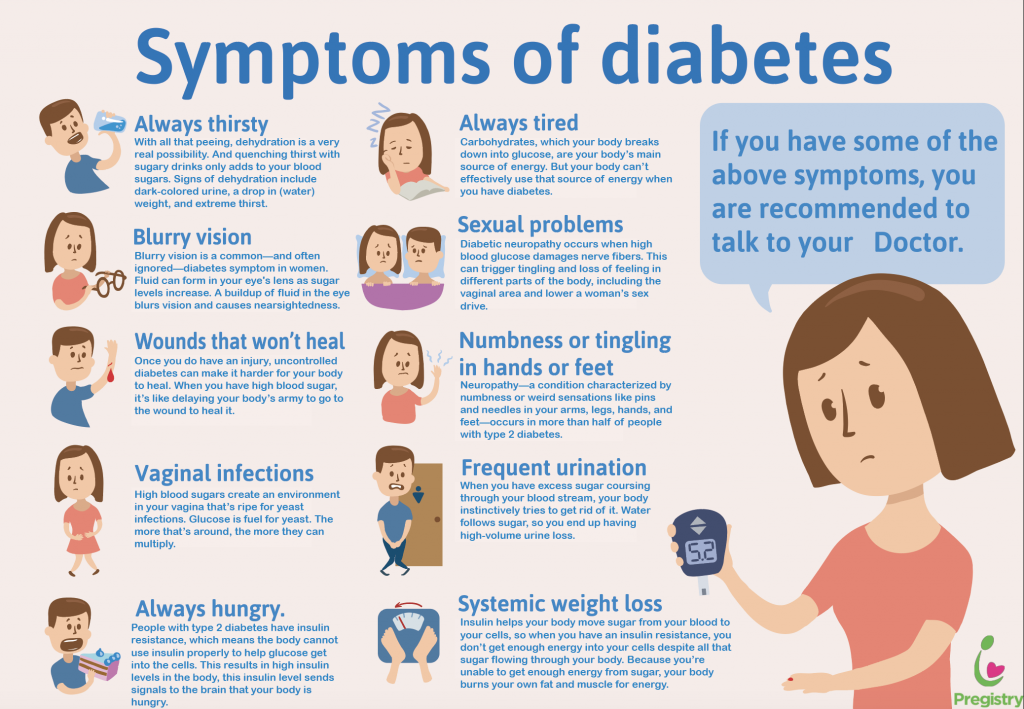Note: The Pregistry website includes expert reports on more than 2000 medications, 300 diseases, and 150 common exposures during pregnancy and lactation. For the topic Diabetes insipidus, go here. For the topic Gestational diabetes, go here. These expert reports are free of charge and can be saved and shared.
______________________________________________________________________________
Having type 1 or type 2 diabetes doesn’t mean you can’t have a baby, but you will have to take some extra precautions. This is because high blood glucose levels and ketones (substances found in diabetics that can be poisonous in large amounts in the body) are able to pass through the placenta to the developing embryo and fetus and can increase the risk of birth defects.
Getting your glucose levels under control before pregnancy
The first trimester is an important time as this is when your baby’s organs are developing – high blood glucose levels during this period can increase the risk of birth defects as well as miscarriage. Since your baby’s organs are actually fully formed by 7 weeks after your last period, it’s important to get your blood glucose levels under control because at this time point you may have only just realized you are pregnant! Due to these first few weeks being so critical to your baby’s development, you need to plan your pregnancy. This means bringing your diabetes under control before getting pregnant if your blood glucose levels are not already in the target range. You should be aiming to get your blood glucose levels controlled around three to six months before you become pregnant. In addition, you’ll need to keep within your blood glucose target range during pregnancy as well as following birth.
Typical blood glucose goals before getting pregnant are:
- 100 – 149 mg/dl one hour after meals
- 60 – 119 mg/dl before eating
- An A1C (glycated hemoglobin) level of less than 7%
However, you should check with your own doctor and team about your specific blood glucose goals as they can change from patient to patient.
As well as achieving your blood glucose target levels you should also put in place a set of healthy lifestyle habits that will help to decrease the risk of complications during pregnancy and to improve the health of your baby. These include improving your diet, getting regular exercise, as well as achieving and maintaining a healthy body weight. In addition you should make sure that you undergo a pre-pregnancy exam. During a pre-pregnancy exam, your doctor will:
As well as achieving your blood glucose target levels you should also put in place a set of healthy lifestyle habits that will help to decrease the risk of complications during pregnancy and to improve the health of your baby. These include improving your diet, getting regular exercise, as well as achieving and maintaining a healthy body weight.
Risks of high blood glucose levels during pregnancy
If blood glucose levels are too high during pregnancy, some possible risks to your baby are the following:
- Birth defects (not usually a risk for women with gestational diabetes)
- Miscarriage
- Premature delivery
- Macrosomia (having a large baby)
- Prolonged jaundice
- Respiratory distress syndrome
- Low blood glucose at birth
Some of the risks for you include the following:
- Urinary and vaginal infections
- Worsening of kidney problems caused by diabetes
- Worsening of eye problems caused by diabetes
- Preeclampsia (dangerously high blood pressure usually with protein in your urine)
- Cesarean section
- Difficult delivery
Additional pre-pregnancy health goals and check-ups
- Measure your A1C levels to make sure your blood glucose levels are under control
- Assess any diabetes-related complications, such as eye damage, kidney damage, nerve damage, high blood pressure, and heart disease
- Evaluate the function of your thyroid (if you have type 1 diabetes)
Your doctor will also review all of your medications and supplements with you to make sure they are safe to continue to use during pregnancy. There are some drugs that are commonly used for diabetes and its complications are not safe to be taken during pregnancy, such as:
- Statins
- ACE (angiotensin-converting enzyme) inhibitors
- ARBs (angiotensin II receptor blockers)
- Most non-insulin therapies
Contraception while preparing for pregnancy
It is important to have a contraceptive method in place while you are ensuring your blood glucose levels are in the target range and implementing healthy lifestyle changes. Just like women without diabetes, women with diabetes have many options available to them. These include intrauterine devices (IUDs), the pill, hormonal implants, barrier methods such as condoms or diaphragms, as well as spermicides. These are all effective methods in reducing the risk of an unplanned pregnancy. Your own health history, your preferences, as well as your partner’s, will determine which method is best for you.



